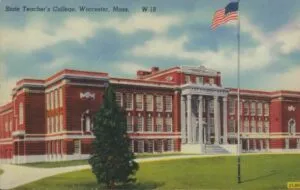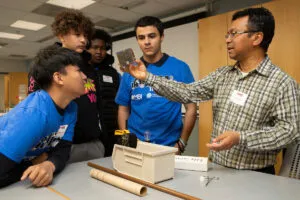The Making of a Legend
Al Pettway ’94 still holds the record as Worcester State’s leading all-time basketball scorer. Now, he’s got another historic win to his name: Coach of the 2023 Massachusetts Division I State Basketball Champions North High.
On March 19, 2023, Worcester State alumnus and the university’s all-time leading basketball scorer Al Pettway made local history (again!) as he coached the young North High School basketball team to the city’s first-ever Division I State Championship. Many were in the stands that day cheering for Al and his kids, including Al’s longtime friend, fellow Worcester State alumnus and former basketball player Steve Bostic ’77, MEd ’86. We recently asked Steve to interview Al for Worcester State Magazine.
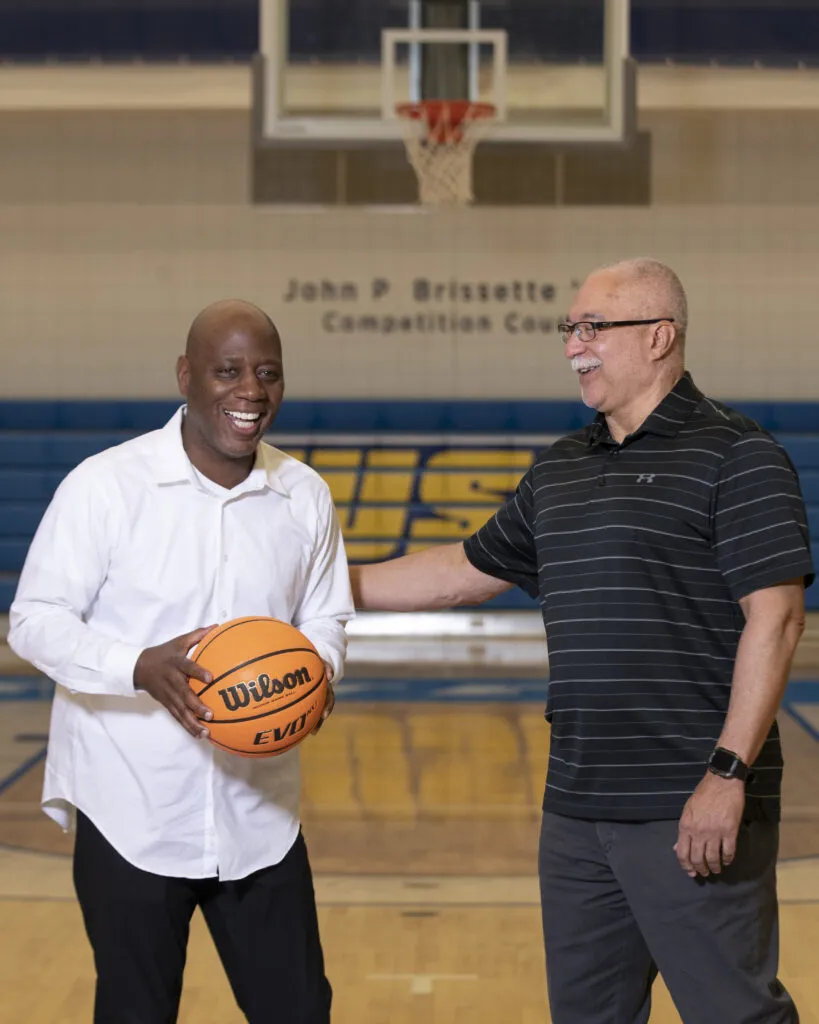
Worcester State alumnus Steve Bostic (right) interviewed his longtime friend Al Pettway for Worcester State Magazine. Photo by Matt Wright ’10
Candid and nostalgic, their conversation recounted Al’s life story from playing “crate ball” on the streets of Bridgeport, Conn, to becoming captain of the Worcester State 1994 team that led the Lancers to the NCAA Tournament. Nearly three decades would pass before another Worcester State team would make it to the NCAA Tournament—that was this year with coach Tyler Hundley.
We share Steve and Al’s conversation, condensed and edited for clarity.
Steve: I thought we could timeline it, going back 30 years. Tell us a little bit about high school and your sports, family, and before you arrived at Worcester State University.
Al: When I went to middle school, I didn’t play any extracurricular sports. I went to see my older cousin playing basketball in a rec league at the local YMCA, and I said, “Wow, this sport looks pretty interesting, and I think I’m going to give it a shot.” So, that was when I started. I was probably 12 years old at the time.
Steve: How many siblings do you have?
Al: Just me and my brother and my mom. My father wasn’t in the picture. I know who he is, but he’s just never been a part of my journey. My mom was pretty sick. I was 10 years old. I was playing almost like a father figure to my younger brother.
Steve: You guys were close.
Al: We were close. I felt like I had to be the protector in the home, since there was no male figure in the home. So it was tough. At 10 years old, you expect to be doing what 10 year old kids do.
Steve: I was still in Boy Scouts.
Al: I was looking after my little brother and my mom, making sure no one did any harm to her. I became a man at such a young age.
Steve: It was about leadership skills at a young age. After you were exposed to basketball through your cousin, when did you start really getting into it?
Al: I asked my mom if she could give me a basketball. Right around the corner there was a little light pole. I remember taking a milk crate and cutting a hole in the bottom of it and nailing it against the pole.
Steve: So it really wasn’t a hoop?
Al: It wasn’t a hoop, but it was a hoop to me. We used to call it crate ball. We made the little basketball court lines, and played on the street. We’d have to stop, cars would go by, we’d start playing again. Everything else is history. I never put it down.
Steve: I would’ve thought there would have been a basketball court on every corner. Growing up in Worcester like I did, every neighborhood had a school yard and a basketball court.
Al: We built a full-court crate because there was a pole on each side. We also had the local Y where I saw my cousin playing. We did go there and it kept us off the streets. That’s pretty much where I started playing, right in that YMCA, the Raphola Taylor Community Center. At Harding High School, I made the freshman team. My sophomore year I played JV. I didn’t start, but I made the team my junior year. I was a split, played half of JV, pretty much most of JV.
Steve: Like Michael Jordan.
Al: Late bloomer. My senior year I made the varsity team, but I didn’t start. I was probably the seventh man off the bench. I started some games. Some games, I didn’t, which was really frustrating for me. At that point, I was like, “I want to continue to play this, but I’m not getting any looks from anybody. So how am I going to go to college and play basketball if I’m sitting on the bench?”
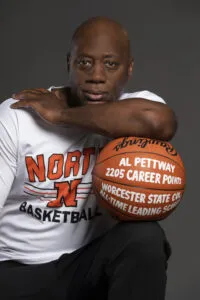
Photo by Matt Wright ’10
Steve: Was the competition strong?
Al: Competition was good, but I thought I was good enough to play. I worked hard. I thought my hard work wasn’t paying off. I was doing everything the coach asked me to do. I didn’t miss practice. I didn’t miss school. I didn’t get in trouble. Other guys were doing the things they weren’t supposed to be doing, but they were still being rewarded. I was a pretty good basketball player too. I was like, “This is just not fair.”
Steve: You didn’t really have an advocate either.
Al: My freshman coach and my JV coach were on the staff of varsity, so they were very supportive. They kept me involved and made sure I didn’t give up. They had what’s called the Top 100 my senior year. The top 100 senior players in the state of Connecticut had the actual shootout in our high school. And then college coaches would come and watch us. That was my first opportunity to play in front of college coaches because there was no AAU. I didn’t go to camps.
Steve: Everything was in person back then, because you didn’t have videos and sites where you could watch the game.
Al: Worcester State’s coach, Tommy Moore, happened to show up and saw me. The next day, I got a letter from him saying that he saw me play and he was interested in me. Tom Moore pretty much recruited me, but it’s interesting because he saw me that one time and that was the only time he saw me. I never saw him in person. He recruited me through phone calls and letters. I never visited Worcester State.
Steve: Before you arrived as a student?
Al: Never saw the campus. At the time, Charles Smith was in the NBA and he’d gone to Harding High School. He played for the New York Knicks and created a Charles Smith Scholarship for any senior basketball player going to college. No seniors in my class who played basketball went to school. I was the only one. So the coach gave it to me.
Steve: So what happened when you got to Worcester State?
Al: My cousin drove me up the week before school started. I’ll never forget this. He dropped me off on campus and said, “Good luck.” I’ve never visited the school. I’m 18 years old. I still haven’t seen Coach Moore. So I went down to the gym. Remember the old school? I saw the gym and I said, “What did I get myself into? I cannot stay here.” I didn’t see anyone that looked like me at the time. So when I first came, it was culture shock. My mom had moved down south because she was sick. My aunt took me in when I was in middle school. I called her and I said, “I can’t stay here.” And she goes, “Well, you’re not coming back here.” And she hung up on me.
Steve: At the beginning of the year when you first showed up there were captain’s practices every day. You were playing for two or three hours. Everybody was trying to feel everyone else out, and you were working for your position, really. It helped me acclimate to the school. Obviously, you want to get your degree. Basketball was kind of the vehicle to help you do that, because you needed to do well in school to play.
Al: Exactly. My goal was to get my grades up, and transfer. I wanted to go into a higher division. But then there was a roadblock in between. My sophomore year, I met my kids’ mom, and one thing led to another, and she became pregnant. I had my daughter when I was a sophomore at Worcester State. That changed all my plans.
Steve: That wasn’t in the plan.
Al: I wasn’t ready to be a father yet. My sophomore year, I think I flunked two classes in the first quarter. I was depressed because I’ve got all this responsibility and I’m trying to get a degree and trying to play basketball, which is a full-time job in itself, and raise a child. There was an article that came out in the Worcester Telegram & Gazette Sports section that said, “Is he going to be a one semester star and end up back in Bridgeport?” I said, “I’ve got to prove everybody wrong. I’m a fighter, so I’m going to stick this out.”
Steve: How did you manage all of that?
Al: Sidney Buxton and Marcella Uribe-Jennings were huge mentors of mine. The AID program helped me get through college. Without that program, I don’t know if I would have graduated from Worcester State. Two or three weeks ago, Sid took me out for lunch to say how proud he was.
So, I stuck it out. It was school, basketball, and my daughter. I always said that I will never do to my child what my father did to me. I really didn’t have that full-blown college experience because I was a father at a young age.
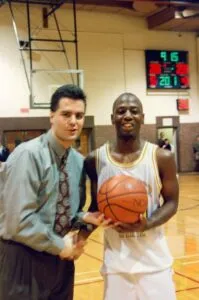
Former Worcester State Men’s Basketball Coach Tom Moore (now assistant head coach at the University of Connecticut) congratulates Al Pettway in 1994 after he broke Worcester State’s scoring record. With 2,205 career points, Pettway remains the university’s all-time leading scorer.
Steve: That is a lot, but by then you had already stepped into adult shoes early in life.
Al: I remember Coach Moore talked about how usually younger guys tend to follow the older guys. He said, “You are different. You are a leader. The older guys followed you.” I’ll never forget him saying, “I think one day when you graduate, you should work with people because you have an influence on people.” And I’ve been working with young people ever since. He was right. I didn’t see that. He saw that.
Steve: How did you end up at North High?
Al: My goal was to coach prep school, Division III, Division II, which I did. And then to go from Division II to Division I. But then, my son comes, and I’m at Assumption, and I’m working on my graduate degree and working in the public school system. There was an opportunity to coach at North High School and I got the job. The plan was to go to the high school for two, three years, and then take that route back to college.
But then, I fell in love with the kids. And I actually won in three years. North won a district title in 2005. That was the first time a city school had won a district title in two and a half decades at North High.
Steve: At that point you had been in the community for 12, 15 years. You’re here now.
Al: I wanted to be a school adjustment counselor. I went back and got my master’s in counseling psychology from Cambridge College. I got my license, and I became a school adjustment counselor. Now, I’m working on my administration degree because I’ve transitioned from a school adjustment counselor to the dean of students. That’s my current position now.
Steve: You and I both experienced college as players and students. What’s your take on student-athletes and the importance of athletics?
Al: When I was growing up playing, and I see this in a lot of the guys that I coach, the only thing I thought about was basketball. All I cared about was, “I need to get to college to play basketball.” I was not worried about what to do with my future. So I try to instill in my guys at a young age, because they all love basketball, that there’s more to it than just basketball. You use the basketball to get to where you need to get. If you can get a scholarship, great. If not, you need to have something to fall back on, because the basketball’s not going to bounce your entire life. It’s going to stop bouncing. As much as basketball is important to you, your academics are just as important, if not more important because basketball can be taken away. But your brain, your knowledge, can’t be.
Steve: The reality is, you can’t play basketball without the academics.
Al: You can’t. Right after school my kids have to go to study hall and get their schoolwork done before they go home. And then, they go play basketball. I monitor their grades. I tell them my story. Some of them don’t have a lot of male role models in their life, but they have me. I try to make sure they don’t go through the same things that I went through.
Steve: You didn’t take a traditional path, but you got there.
Al: Considering what I’ve gone through as a kid and not having a male role model there, and mom, let her soul rest, mom not being there, I don’t have any regrets. I’m thankful for my journey because it’s led me to a better path.
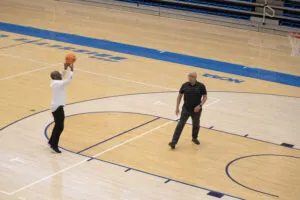
Photo by Matt Wright ’10
Steve: No question. A lot of coaches can’t tell the same story that you do. You have the coaches who grew up in upper middle-class families or even higher, and they went to the prep schools and they had everything given to them, including the camps and gyms. Their story is much different. And the player might look at a coach like that and say, “Well, you don’t know what I’m dealing with.”
Al: I always say, “You never know what people carry in their backpack.” I talk to the teachers all the time about the concerns they may have about their students. I tell the teachers, “Don’t give up on them.” I’ve had people that said to me that I wouldn’t be anything in life. The worst thing you can do is give up on a kid. I see myself as those kids. I was those kids. I tell my kids, you can do anything you want to do, guys. I’m living proof. It’s not going to always be easy for you. There’s going to be some rocky times. You just have to stay the course, and you’ll be okay.
Steve: Staying the course got you guys to a championship here at Worcester State in your playing days. What was that experience like?
Al: It’s like yesterday. I felt like that was destined to happen. It was four years I’ll never forget. I beat every team in the conference except Salem State. We played Salem State on our floor for the championship my senior year, and we beat them to go to the NCAA tournament in 1994. That was an amazing feeling.
Steve: My mother used to say, “There’s some things they can’t take away from you.” That’s something they can never take away from you. And now, as dean of students, you’re coaching a state championship. That’s in the history books.
Al: The high school championship was the first time in the history of Worcester a Division I team in the public schools has ever done it.
Steve: There’s been some good teams here. They’ve got to the brink, including an Old North team.
Al: They’ve come close, but no one’s ever been able to get over the top. For us to do it was an amazing, amazing experience. I knew we had a really good team when this team was assembled in December at tryouts. But my question mark is, how am I going to deal with all these different personalities? Are they going to be able to put those things aside for the betterment of the team? Our home jersey says “Family.” And our away jersey says “Unity.” I talked to them about family. Families sometimes fight, but at the end of the day, families stick together. You guys have to stick together. We’re not going to do this with one individual. We’re going to do this as a team. We got to the Final Four, playing Newton North again, at Taunton High School to get to the state finals.
Steve: That always makes you nervous because you’re playing a team for a second time.
Al: They had just gone to the state finals the previous year, so they had the experience. We ended up beating them again. So now we’re playing Needham. We are literally at the big stage with a chance to make history. Not once did we talk about records. We just kept playing. I didn’t think we would go undefeated in the state of Massachusetts, but we did. We beat Needham to win the state title. We went 23 and zero. Then we became the first team in the history of Worcester Public Schools to ever win a Division I title. That was just an amazing moment.
Steve: I was there for the game, and there’s a point where you knew the game was yours.
Al: I knew.
Steve: There was still time on the clock and everybody’s going crazy. And you’re going crazy. You’re getting everybody all excited.
Al: I was told you couldn’t throw water on people, but it was the last game of the day. So, I walked in, and they’re dumping ice-cold water on me. I knew at that point, “Wow, we did it.” But it didn’t really hit me until maybe a week later because there were a lot of phone calls. [Celtics President] Brad Stevens called and wanted to talk about what a great job the coaching staff did with the team. Two days later the Celtics put us on the Jumbotron congratulating us as the Division I state champion. And then the city did a parade for us. We’ve been invited to the Hoophall Classic. I don’t know the last public school to get invited to the Hoophall Classic at Springfield College with all the best basketball talent in the world.
Steve: A lot of moments. The sweet thing about winning it is that you can only equal it. You can’t top it.
Al: So where do we go from here? Everyone’s saying, “Your team is young, you have everyone back, you just run it back.” Hopefully we come back with a chance to try to do it again, which has never been done. So that’d be really nice.
Steve: The Al Pettway story.
Al: Be a leader, not a follower. That’s it. That’s me.

